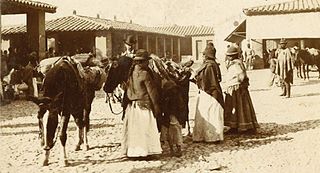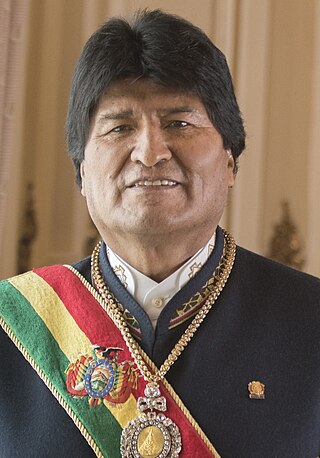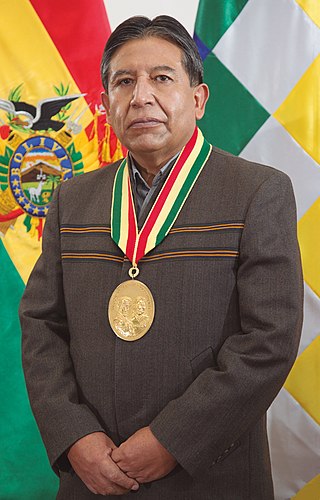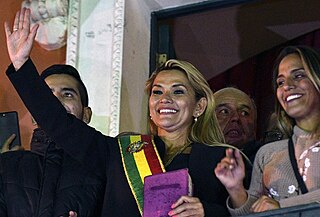Related Research Articles

Bolivia, officially the Plurinational State of Bolivia, is a landlocked country located in central South America. It is a country with the largest geographic extension of Amazonian plains and lowlands, mountains and Chaco with a tropical climate, valleys with a warm climate, as well as being part of the Andes of South America and its high plateau areas with cold climates, hills and snow-capped mountains, with a wide biome in each city and region. It is part of the largest swamp in the world between Bolivia and Brazil. It is bordered by Brazil to the north and east, Paraguay to the southeast, Argentina to the south, Chile to the southwest, and Peru to the west. The seat of government is La Paz, which contains the executive, legislative, and electoral branches of government, while the constitutional capital is Sucre, the seat of the judiciary. The largest city and principal industrial center is Santa Cruz de la Sierra, located on the Llanos Orientales, a mostly flat region in the east of the country with a diverse non-Andean culture.

The president of Bolivia, officially known as the president of the Plurinational State of Bolivia, is head of state and head of government of Bolivia and the captain general of the Armed Forces of Bolivia.

The Aymara or Aimara, people are an indigenous people in the Andes and Altiplano regions of South America. Approximately 2.3 million Aymara live in northwest Argentina, Bolivia, Chile, and Peru. The ancestors of the Aymara lived in the region for many centuries before becoming a subject people of the Inca Empire in the late 15th or early 16th century, and later of the Spanish in the 16th century. With the Spanish American wars of independence (1810–1825), the Aymaras became subjects of the new nations of Bolivia and Peru. After the War of the Pacific (1879–1883), Chile annexed territory with the Aymara population.

Juan Evo Morales Ayma is a Bolivian politician, trade union organizer, and former cocalero activist who served as the 65th president of Bolivia from 2006 to 2019. Widely regarded as the country's first president to come from its indigenous population, his administration worked towards the implementation of left-wing policies, focusing on the legal protections and socioeconomic conditions of Bolivia's previously marginalized indigenous population and combating the political influence of the United States and resource-extracting multinational corporations. Ideologically a socialist, he has led the Movement for Socialism (MAS) party since 1998.

The Bolivian gas conflict was a social confrontation in Bolivia reaching its peak in 2003, centering on the exploitation of the country's vast natural gas reserves. The expression can be extended to refer to the general conflict in Bolivia over the exploitation of gas resources, thus including the 2005 protests and the election of Evo Morales as president. Before these protests, Bolivia had seen a series of similar earlier protests during the Cochabamba protests of 2000, which were against the privatization of the municipal water supply.

David Choquehuanca Céspedes is a Bolivian diplomat, peasant leader, politician, and trade unionist serving as the 39th vice president of Bolivia since 2020. A member of the Movement for Socialism, he previously served as minister of foreign affairs from 2006 to 2017 and as secretary general of ALBA from 2017 to 2019.

The current Constitution of Bolivia came into effect on 7 February 2009 when it was promulgated by President Evo Morales, after being approved in a referendum with 90.24% participation. The referendum was held on 25 January 2009, with the constitution being approved by 61.43% of voters.

The Media Luna or Media Luna Ampliada refers to a group of four departments – Santa Cruz, Beni, Pando, and Tarija – in Bolivia which are home to a greater proportion of opponents to the national government led by Evo Morales and the Movement for Socialism (MAS) than the rest of the country. Pando has seen increasing support for MAS since 2009, while Tarija was initially supportive but has opposed MAS in every election after 2014. In contrast to the predominantly Indigenous Andean populations of the Andean region such as La Paz and Cochabamba, the departments in the Media Luna are majority mestizo, as well as being made up of the remaining 26 groups of lowland indigenes with white minorities, specifically in Santa Cruz de la Sierra.

The Bolivian Constituent Assembly, convened on August 6, 2006, in Sucre, with the purpose of drafting a new national constitution by December 14, 2007; extended from the original deadline of August 6, 2007. The Assembly approved the new Political Constitution of the State on 9 December 2007. It was put to a national referendum held on 25 January 2009, and went into force on 7 February 2009.

Bolivia–United States relations were established in 1837 with the first ambassadorial visit from the United States to Peru–Bolivian Confederation. The Confederation dissolved in 1839, and bilateral relations did not occur until 1848 when the United States recognized Bolivia as a sovereign state and appointed John Appleton as the Chargé d'Affaires.
The history of Bolivia involves thousands of years of human habitation.

The foreign policy of the Evo Morales administration concerns the policy initiatives made towards other states by the former President of Bolivia, in difference to past, or future, Bolivian foreign policy. Morales' foreign policy can be roughly divided between that of the Americas and the rest of the world.

The domestic policy of the Evo Morales administration refers to the domestic policy initiatives of the former President of Bolivia, including past pre-presidential advocacies by Morales.

The Presidency of Evo Morales began on January 22, 2006 when Evo Morales was inaugurated as the 80th President of Bolivia, following his victory in the 2005 general election, where he won 53.7% of the vote, defeating Jorge Quiroga, Samuel Doria Medina, and several other candidates. Morales increased taxation on the hydrocarbon industry to bolster social spending, emphasising projects to combat illiteracy, poverty, racism, and sexism. Vocally criticizing neoliberalism and reducing Bolivia's dependence on the World Bank and International Monetary Fund, his administration oversaw strong economic growth while following a policy termed "Evonomics" which sought to move from a liberal economic approach to a mixed economy. Scaling back U.S. influence in the country, he built relationships with leftist governments in the Latin American pink tide and signed Bolivia into the Bolivarian Alliance for the Americas. Attempting to moderate the left-indigenous activist community, his administration also opposed the right-wing autonomist demands of Bolivia's eastern provinces. Winning a recall referendum in 2008, he instituted a new constitution that established Bolivia as a plurinational state and was re-elected in 2009. His second term witnessed the continuation of leftist policies and Bolivia's joining of the Bank of the South and Community of Latin American and Caribbean States; he was again reelected in the 2014 general election. Following the disputed 2019 general election and the ensuing unrest, Morales resigned and flew to Mexico where he had been granted political asylum.

The Indigenous peoples in Bolivia or Native Bolivians are Bolivians who have predominantly or total Amerindian ancestry. They constitute anywhere from 20 to 60% of Bolivia's population of 11,306,341, depending on different estimates, and depending notably on the choice Mestizo being available as an answer in a given census, in which case the majority of the population identify as mestizo, and they belong to 36 recognized ethnic groups. Aymara and Quechua are the largest groups. The geography of Bolivia includes the Andes, the Gran Chaco, the Yungas, the Chiquitania and the Amazon Rainforest.

Bolivia–Spain relations are the current and historical relations between Bolivia and Spain. Both nations are members of the Association of Spanish Language Academies, Organization of Ibero-American States and the United Nations.
The 2019 Bolivian protests, also known as the Pitita Revolution, were protests and marches from 21 October 2019 until late November of that year in Bolivia, in response to claims of electoral fraud in the 2019 general election of 20 October. After 11 November 2019, there were protests by supporters of the outgoing government in response to Jeanine Áñez becoming the acting president of Bolivia. The claims of fraud were made after the suspension of the preliminary vote count, in which incumbent Evo Morales was not leading by a large enough margin (10%) to avoid a runoff, and the subsequent publication of the official count, in which Morales won by just over 10%. Some international observers expressed concern over the integrity of the elections.

A political crisis occurred in Bolivia on 10 November 2019, after 21 days of civil protests following the disputed 2019 Bolivian general election in which incumbent President Evo Morales was initially declared the winner. The elections took place after a referendum to amend the Bolivian constitution, which limits the number of terms to two, was rejected in 2016. In 2017, the Constitutional Tribunal (TCP) ruled that all public offices would have no term limits despite what was established in the constitution and allowing Evo Morales to run for a fourth term.

Rafael Arcángel Quispe Flores, often referred to as Tata Quispe, is a Bolivian indigenous activist and politician who served as general executive director of the Indigenous Development Fund from 2019 to 2020. He previously served as a substitute party-list member of the Chamber of Deputies from La Paz under María Eugenia Calcina from 2015 to 2019.

The 2024 Bolivian protest is an ongoing weeklong nationwide protest held by former president Evo Morales against the sitting president Luis Arce government The first wave of protest began in the town of Caracollo in Oruro.
References
- ↑ "Red Ponchos kill dogs as a threat" [ dead link ]. Archived from the original on April 10th, 2009. Retrieved on April 23rd, 2009. (translated version here).
- ↑ "Los Ponchos Rojos, la fiel y temible milicia aymara de Evo Morales que aún pelea contra la conquista española". www.clarin.com. 12 November 2019.
- ↑ "Manifestacion de Ponchos Rojos piden guerra civil en Bolivia". prensa-latina.cu.
- ↑ "Ponchos Rojos".